Preserved Lemons: Flavor Secrets of Moroccan Home Cooking
Oct 14,2021
Preserved Lemons: Flavor Secrets of Moroccan Home Cooking
Oct 14,2021
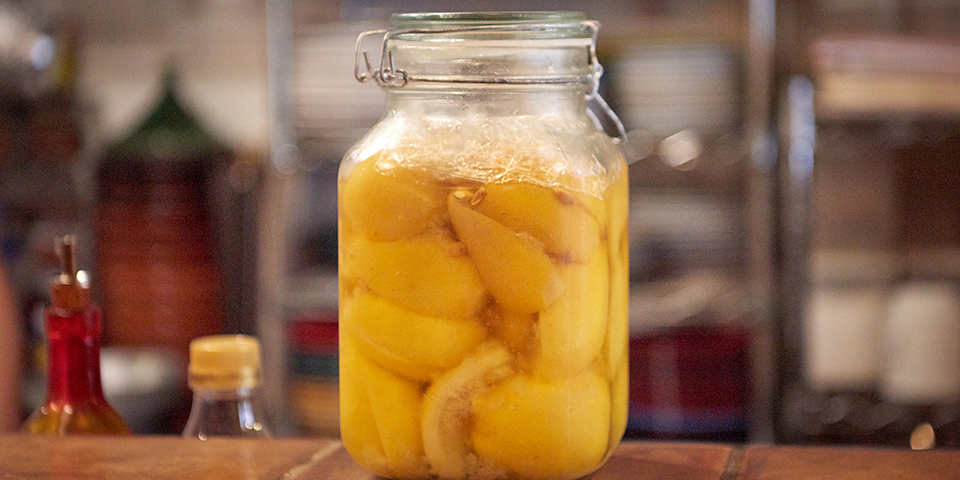

Tagine and couscous are two classic Moroccan foods that have become well known in Japan. Another has gained the spotlight recently: the fermented condiment preserved lemon.
To learn more about the appeal of Moroccan cuisine, and about Moroccan preserved lemons in particular, we talked with Ogawa Ayumi. She’s the owner and chef of the Moroccan restaurant Enrique Marruecos in the Higashi-Kitazawa neighborhood of Tokyo.
“Moroccans eat tagine six days a week,” according to Ayumi, “and on the seventh they eat couscous, which is made from granules of pasta.”
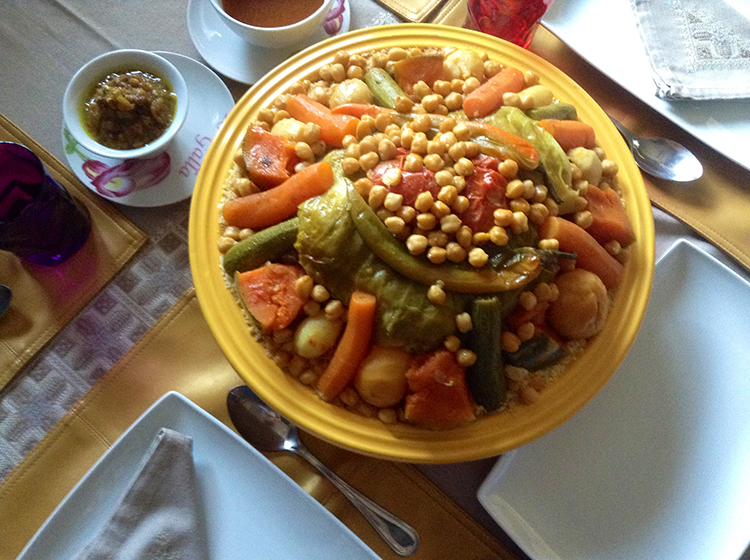
Couscous as served in the typical Moroccan home
“Tagine comes in a great variety of flavors depending on the combination of meat, fish, vegetables, spices, and herbs. Basically, you put chicken, mutton, beef, or other meat in the tagine pot with seasonal vegetables, place on the lid, and slow-cook them.
“The seasoning isn’t very fancy: several spices and herbs, some salt, and that’s it. Morocco, being on the Mediterranean, has many different types of vegetables. They have a plain but well-defined taste, so they’re delicious enough in themselves.”
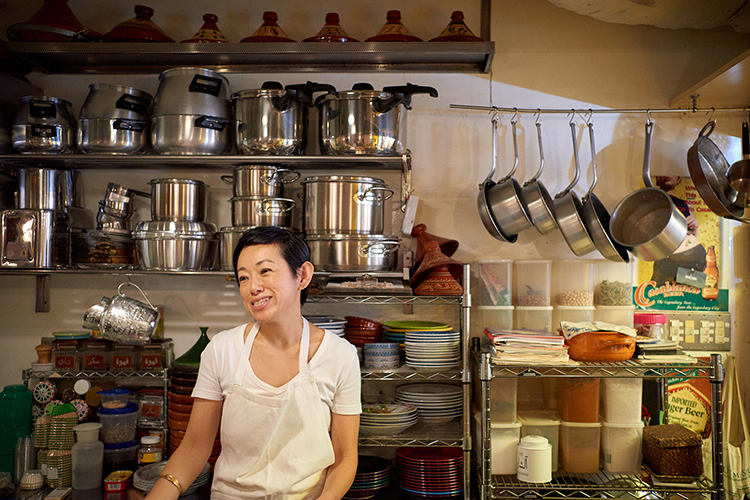
Ogawa Ayumi, owner and chef of Enrique Marruecos
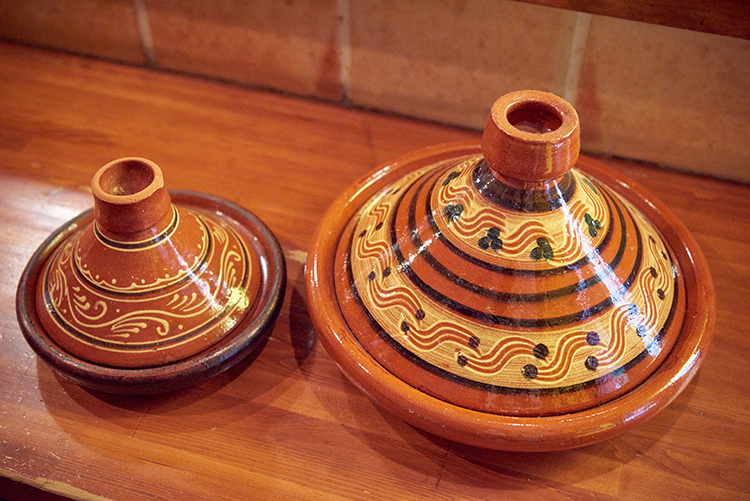
Tagine pots come in many different sizes and shapes. They also vary in design from region to region.
Ayumi first visited Morocco in her university days. She stayed for about a month on a trip she took before graduating. She was already an experienced backpacker, having traveled to different parts of the world every holiday.
“I’ve always loved cooking, and when I went to restaurants in different countries, I’d ask to see the kitchen. In Morocco, people weren’t just happy to show me the restaurant kitchen; they’d invite me to their home. ‘Our home cooking tastes even better!’ they’d say. In the end, I ate alone just three or four times during the entire month of my stay. Other than that, Moroccans I’d gotten to know would have me over for a meal at their home.”
Ayumi was fascinated by the Moroccan home cooking that she encountered on these occasions.
“Moroccans are very conservative about their food. They hardly ever eat out. They’re convinced that the best-tasting food is what they eat at home. They believe in bringing out the flavor of the ingredients, so the seasoning is basically simple. What amazed me about Moroccan food was that the flavor had depth but wasn’t complex, even though it made extensive use of spices. I wasn’t even fond of spices.”
After graduating from university, Ayumi found an editorial job, but she felt it wasn’t right for her and left to pursue a culinary career. She then kept busy working as an assistant to a food expert. Her old passion for Morocco reawakened along the way. In 2004, she moved to Morocco on her own despite having no connections there and not knowing the language.
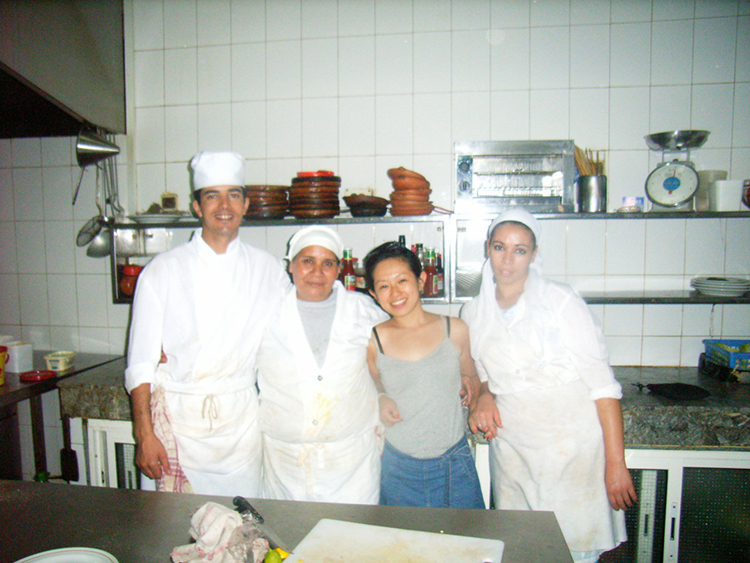
Ayumi and her Moroccan workmates
“At first, I worked at a series of restaurants where English was spoken and learned Arabic in the meantime. Every day I would watch the local cooking show on TV. It was fascinating. It featured the doyenne of Moroccan food experts, Choumicha, and one day I practically barged in on her. My enthusiasm must have gotten across, because I got to work on her staff, though she took me on as an apprentice at first. There I learned everything from traditional Moroccan home cooking to modern Moroccan cuisine incorporating French and Italian elements.”
Ayumi’s determination gained her connections, and she spent a fulfilling five years in Morrocco. Then, after returning to Japan in 2009, she opened her own restaurant, which recreates authentic Moroccan cuisine. For Moroccans in Japan, it tastes just like mom’s cooking back in the old country. Besides tagine and couscous, another popular item on the menu is a soup called harira, which Moroccans eat when breaking the Ramadan fast.
Preserved lemons are a traditional fermented condiment that have been used in Morocco since olden times. They’re made by scoring lemons, rubbing salt into them, and letting them ferment for a month to several years. They’re the Moroccan equivalent of miso or soy sauce in Japan. Families make their own, and they’re also sold at the market.
Moroccan lemons are somewhat smaller than those generally available in Japan, as well as being rounder. They’re characterized by their mildly tart flavor and intense aroma.
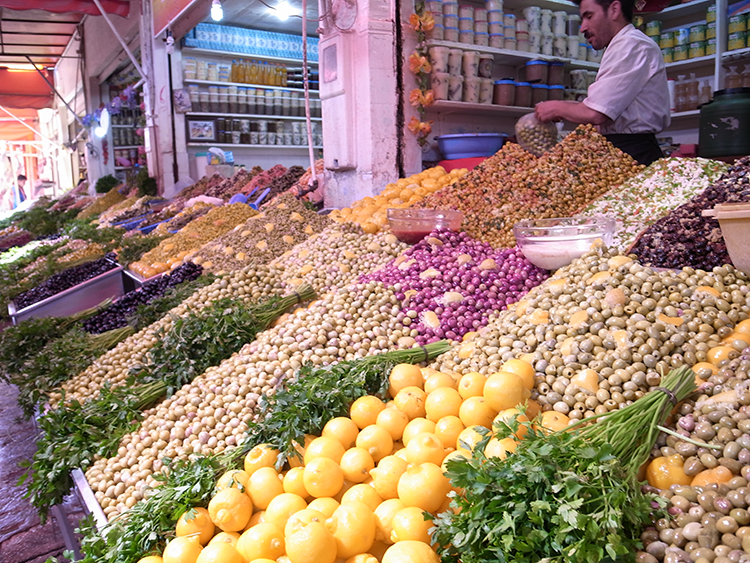
The shop in Morocco where Ayumi would always buy preserved lemons
“In Morocco, preserved lemons aren’t so much a condiment as a means of masking the smell of meat and imparting an attractive aroma. In the old days each family would make their own, but now even Moroccans regularly buy them at the market. They’re sold for so much per gram, just like pickled vegetables and miso are in Japan. The peel is what’s principally used for cooking; no use is made of the liquid they’re pickled in. The peel is chopped into small pieces or minced and sprinkled onto tagine. The pulp is massaged into chicken. To get a better idea of what preserved lemons are, you can think of them as being used in place of cooking wine. Alcohol isn’t used in cooking because Morocco is a Muslim country.”
Ayumi demonstrated how to make preserved lemons the Moroccan way.
“Cut a deep cross into one end of each lemon, taking care not to slice right through it. Then pack lots of coarse-grained salt into the cuts and put the lemons into a jar with the cut side facing down. The trick is to keep stuffing those lemons in, even if you figure no more will go in. I give the lemons a punch at the end to push them in [laughs].”
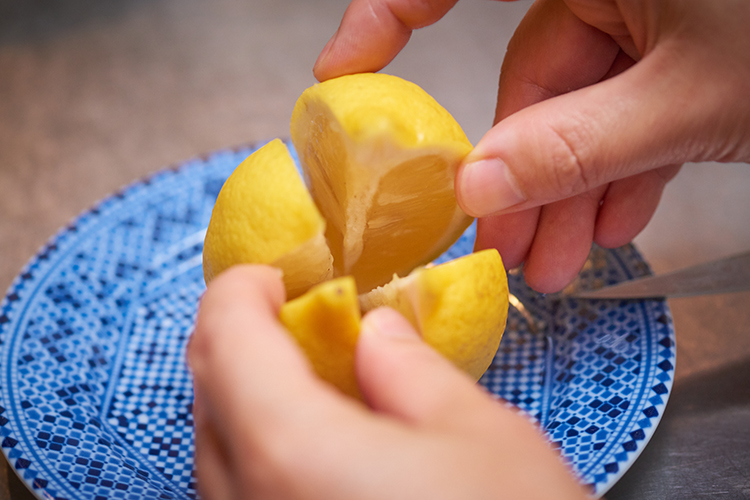
Cut a deep cross into each lemon.
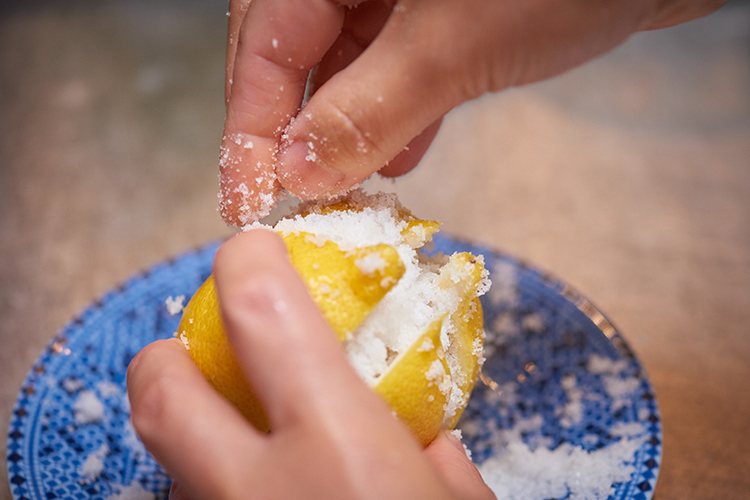
Pack with plenty of coarse-grained salt.
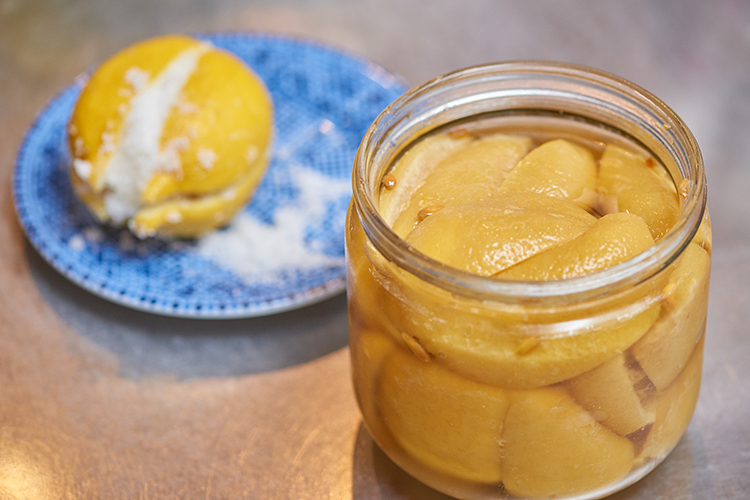
Pack into a jar until full to the brim, then store in the fridge. They’ll be ready in about a month.
Next, put the lid firmly on the jar and place it in the fridge. Flip the jar over several times a day so the salt penetrates evenly. Once the moisture is released and the lemons are completely submerged, keep them in the fridge. They’ll be ready in about a month. As long as they’re properly pickled, they’ll keep for several years.
“The lemons still taste fresh for the first three or four weeks after being pickled, but the peel becomes softer the longer they’re pickled, and the flavor turns milder. Lemons spoil easily when they come into contact with air, so I line the inside of the jar with plastic wrap. There were people in Morocco who poured in oil.”
Ayumi hasn’t been able to get to Morocco lately because the Covid pandemic makes it difficult to travel overseas. But her sights are already set on the future.
“I took classes at a sushi academy when we were closed for Covid. I had real trouble finding a job in Morocco, which was a frustrating experience. If I’d known how to make sushi, any restaurant would have hired me. I want to be ready to travel to other parts of the world whenever the fancy takes me.”
It’s been twelve years since Enrique Marruecos opened. “And we’re not done yet!” says Ayumi with a smile, even as she looks forward to her next culinary adventure abroad.
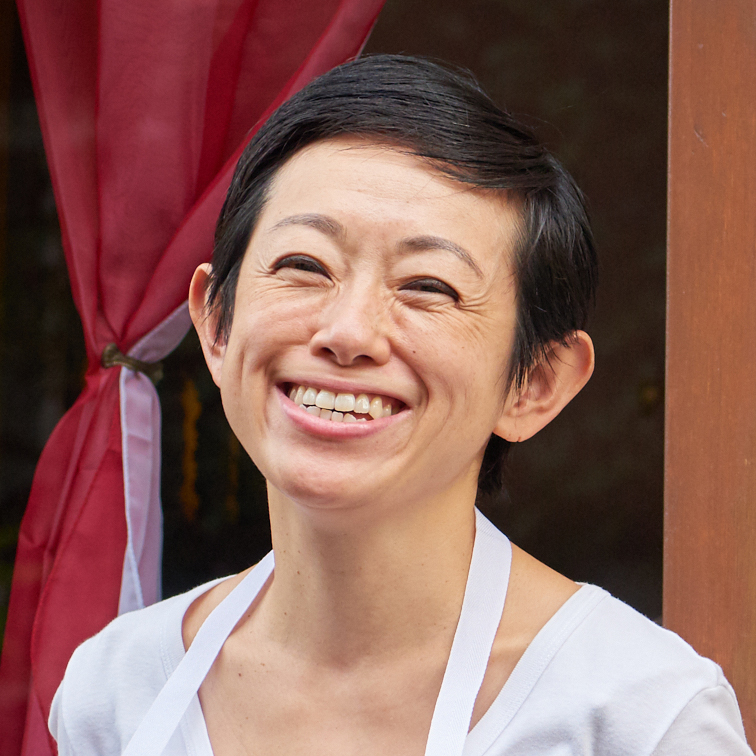
Ogawa Ayumi studied with Moroccan chef Choumicha during her five years in Morocco. There she learned how to make local Moroccan dishes while working as an assistant to a Moroccan cooking show and helping put together the cooking page of a magazine. In 2009, she opened the Moroccan restaurant Enrique Marruecos, of which she serves as owner and chef. She also acts as a culinary consultant to magazines and is a published author. Her books include Enjoying Moroccan Cooking at Home (published by Kawade Shobo Shinsha).